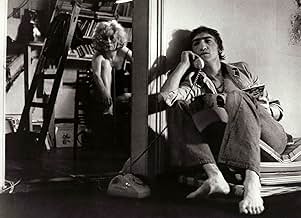Adicionar um enredo no seu idiomaFrau Kusters is preparing dinner late one seemingly-ordinary afternoon in her seemingly-ordinary kitchen in Frankfurt, Germany. She wants to add canned sausages to the stew; her annoying dau... Ler tudoFrau Kusters is preparing dinner late one seemingly-ordinary afternoon in her seemingly-ordinary kitchen in Frankfurt, Germany. She wants to add canned sausages to the stew; her annoying daughter-in-law thinks otherwise. But the point is moot: Mr. Kusters has murdered the personn... Ler tudoFrau Kusters is preparing dinner late one seemingly-ordinary afternoon in her seemingly-ordinary kitchen in Frankfurt, Germany. She wants to add canned sausages to the stew; her annoying daughter-in-law thinks otherwise. But the point is moot: Mr. Kusters has murdered the personnel director at the soap factory where he works--and followed that by committing suicide.
- Direção
- Roteiristas
- Artistas
- Prêmios
- 3 indicações no total
- Redacteur - in - chief Linke
- (não creditado)
- Direção
- Roteiristas
- Elenco e equipe completos
- Produção, bilheteria e muito mais no IMDbPro
Avaliações em destaque
Immediately the vulnerable "Mother Kusters" is hounded by reporters from the boulevard press. Twisting her words, as well as those of children and a pregnant daughter in-law, along with taking countless bad-angle photographs, the press has their story. The name of easy-going, kind and obedient Father Kusters is ruined.
Several characters bring definite color to this unusual story. Mother Kusters' 30-something daughter, an aspiring lounge singer (a la Marlene Dietrich) shamelessly exploits her newly gained celebrity status by initiating press interviews about her father's tragedy, then moving in with the questionable reporter, who also arranged singing work through "connections".
Mother Kusters soon is "lulled in" by some upscale and persuasive communists, who appear sympathetic, but eventually seem to be exploiting the poor old woman for their own political gains. Finally Mother Kusters ends in a bizarre trap she unwittingly fell for: A group of anarchists, under the pretense of assuring that her husband's name will be cleared, use the woman in a hostage stand-off aimed at the release of political prisoners. - The final scene suddenly stops in a freeze frame, with a brief written description of the immediate action to follow. WOW!
Although not among Fassbinder's great classics, this is an impressive film. The statements made here were originally (in the mid-70s) met with criticism. The treatment of communism and anarchy (in a not necessarily negative way) were seen as contrary to common acceptance of the day. Years after the Cold War's end, the story of "the factory murderer" seems dated. Still, a well-worth-seeing film!
The film drew on both Douglas Sirk's melodramas and Weimar era workers' films to tell a political coming of age story. Fassbinder also clearly criticizes the small German Communist Party's moderation and "armchair activism". Now, I know nothing about the German Communist Party of the 1970s, but I do know Sirk and Fassbinder's borrowing. This film is one of the most obvious Sirk nods I have seen yet. And, therefore, one of the better Fassbinder films.
Você sabia?
- CuriosidadesFinal theatrical film of Karlheinz Böhm.
- Citações
Emma Küsters: Everybody's out for something. Once you realize that, everything is simple.
Principais escolhas
- How long is Mother Kusters Goes to Heaven?Fornecido pela Alexa
Detalhes
- Data de lançamento
- País de origem
- Idioma
- Também conhecido como
- Mother Kusters Goes to Heaven
- Locações de filme
- Empresas de produção
- Consulte mais créditos da empresa na IMDbPro
Bilheteria
- Orçamento
- DEM 750.000 (estimativa)
- Faturamento bruto nos EUA e Canadá
- US$ 8.144
- Fim de semana de estreia nos EUA e Canadá
- US$ 11.623
- 16 de fev. de 2003
- Faturamento bruto mundial
- US$ 8.148
Contribua para esta página


































